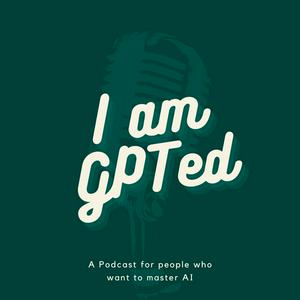Hey there, AI adventurers! It's Malachi, your Misfit Master of AI, back with another episode of "I am GPTed." Today, we're diving into some practical tips and techniques to help you navigate the wild world of AI without getting lost in the jargon jungle.First up, let's talk about a prompting technique that can really up your AI game. It's called "progressive prompting," and trust me, it's not as fancy as it sounds. Let's be real and get analog here... think of it like cooking a meal. You don't just throw all the ingredients in at once and hope for the best, right? Nah, you add things step by step, tasting as you go, until you've got a Michelin-star-worthy dish. Progressive prompting is the same deal.Here's an example: instead of asking an AI to "write a blog post about the benefits of meditation," start with something like, "List five benefits of meditation." Then, take that output and feed it back in with, "For each benefit, provide a brief explanation and a real-life example." Finally, you might say, "Use the previous information to create a well-structured blog post with an introduction and conclusion." See? Step by step, tasting as you go. I learned this the hard way when I tried to get an AI to write my entire memoir in one go. Trust me, it wasn't pretty.Now, let's talk about a practical use case you might not have considered: using AI to help with your everyday writing tasks, like emails or reports. I know, I know, it sounds like something out of a sci-fi movie, but it's real, and it's incredibly helpful. You can use AI to generate outlines, brainstorm ideas, or even polish up your grammar and style. It's like having a personal writing assistant, minus the coffee runs and the judgy looks when you use "who" instead of "whom."But before you go AI-wild, let me warn you about a common mistake beginners make: over-relying on the AI. It's easy to get caught up in the "ooh, shiny!" factor and just accept whatever the AI spits out. But remember, AI is a tool, not a replacement for human judgment. Always review and edit the output, and don't be afraid to tweak or even discard what doesn't work. I once used an AI to write a love letter to my partner, and let's just say I'm lucky they have a good sense of humor.So, how can you practice and improve your AI skills? Here's a simple exercise: take a piece of writing you've done recently, like an email or a social media post, and try rewriting it with the help of an AI. Compare the original and the AI-assisted version, and see what you can learn from the differences. Maybe the AI helped you tighten up your sentences, or maybe it suggested a new angle you hadn't considered. The more you practice, the better you'll get at leveraging AI to enhance your own writing.Finally, let's talk about evaluating and improving AI-generated content. The key here is to look for coherence, relevance, and originality. Does the output make sense and flow logically? Does it actually address the prompt or question you asked? And does it bring something new and valuable to the table, or is it just regurgitating generic info? If you're not happy with the output, don't be afraid to tweak your prompt and try again. It's all part of the learning process.But I digress... the point is, AI is a powerful tool, but it's not a magic wand. It takes practice, patience, and a willingness to learn from your mistakes. Anyway, back to what actually helps... remember, progressive prompting, practical use cases, avoiding over-reliance, practicing with your own writing, and evaluating for coherence, relevance, and originality. These are the keys to unlocking the potential of AI in your writing.Before I sign off, let me share a quick personal anecdote. When I first started using AI for writing, I thought it would be a breeze. I mean, how hard could it be? Just type in a prompt and let the machine do the work, right? Oh, how naive I was. My first few attempts were a disaster. The output was generic, irrelevant, and sometimes downright nonsensical. But I didn't give up. I kept practicing, learning from my mistakes, and refining my techniques. And you know what? It paid off. Now, I can use AI to enhance my writing in ways I never thought possible. And if I can do it, trust me, anyone can.This is Malachi, your Misfit Master of AI, signing off. Remember, if I can figure this stuff out, anyone can. Don't forget to subscribe to the podcast, and a huge thanks for listening. If you want to learn more or have a burning question about AI and writing, send it my way at
[email protected]. You can also check out inceptionpoint.ai for more info and resources.And hey, if you enjoyed this episode, why not share it with a friend who could use a little AI guidance in their life? Spread the love, people!As always, this has been a Quiet Please production. For more AI awesomeness, head over to quietplease.ai.Until next time, keep learning, keep practicing, and keep being real. Peace out!

